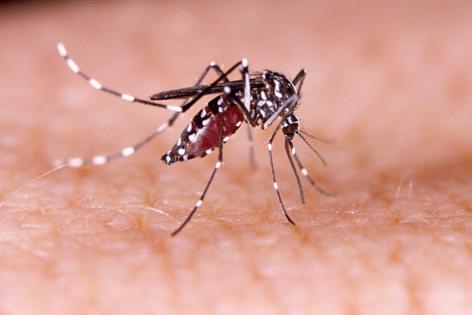Death from mosquito-borne virus reported in New Hampshire as region faces outbreak
Published in News & Features
BOSTON — A Massachusetts resident has died from Eastern Equine Encephalitis as the region faces an outbreak from the serious disease transmitted by infected mosquitoes.
This death reported in New Hampshire comes after a man in Massachusetts tested positive for EEE, along with a horse and dozens of mosquito samples. As a result, the Bay State is conducting aerial and truck-mounted ground spraying for mosquitoes in Plymouth and Worcester counties.
Massachusetts health officials on Tuesday also reported two more human cases of West Nile virus, and raised the virus risk level to high across numerous communities.
In New Hampshire, health officials said they identified an adult from Hampstead — near the Massachusetts border — who tested positive for EEE. The person was hospitalized due to severe central nervous system disease, and later died.
Before this outbreak, the last reported human EEE infection in New Hampshire was in 2014 when health officials identified three human infections, including two fatalities.
“In New Hampshire, mosquitoes transmit infections including Eastern Equine Encephalitis Virus, West Nile Virus and Jamestown Canyon Virus,” said State Epidemiologist Benjamin Chan.
“We believe there is an elevated risk for EEEV infections this year in New England given the positive mosquito samples identified,” Chan added. “The risk will continue into the fall until there is a hard frost that kills the mosquitoes. Everybody should take steps to prevent mosquito bites when they are outdoors.”
EEE can cause flu-like symptoms such as fever, chills, muscle aches, and joint pain. EEE can also cause severe neurological disease, such as inflammation of the brain and membranes around the spinal cord (including encephalitis and meningitis).
About 33% of all people who develop encephalitis from EEE die from their infection, and many others experience life-long physical or mental impacts. There is no vaccine or antiviral treatment for EEE.
Meanwhile in Massachusetts, the Department of Public Health announced two additional human cases of West Nile virus, bringing the total number of human cases to four. Both people are males in their 60s.
One was exposed in Suffolk County in an area known to be at increased risk. The other was exposed in Norfolk County.
As a result, multiple communities have been raised to high risk for the virus: Cambridge, Everett, Medford, Newton, Somerville, and Watertown in Middlesex County, and Brookline, Milton, and Quincy in Norfolk County.
“We are currently in the peak time for West Nile virus activity in Massachusetts, which will continue into September. As the amount of disease in mosquitoes increases, so do the chances for human infection,” said Public Health Commissioner Robbie Goldstein.
“It is important that people throughout the state continue to take steps to avoid mosquito bites,” Goldstein added. “The risk of West Nile virus in Massachusetts will not go away until the first hard frost.”
People can prevent EEE and West Nile virus infection by taking steps to prevent mosquito bites, including using effective mosquito repellents, wearing long sleeves and pants when outside, and avoiding outdoor activities in the early morning and evening hours when mosquitoes are most active.
It’s also important for residents to remove standing water from around their homes to reduce mosquito populations, and ensure doors and windows have tight-fitting screens without holes.
______
©2024 MediaNews Group, Inc. Visit at bostonherald.com. Distributed by Tribune Content Agency, LLC.







Comments